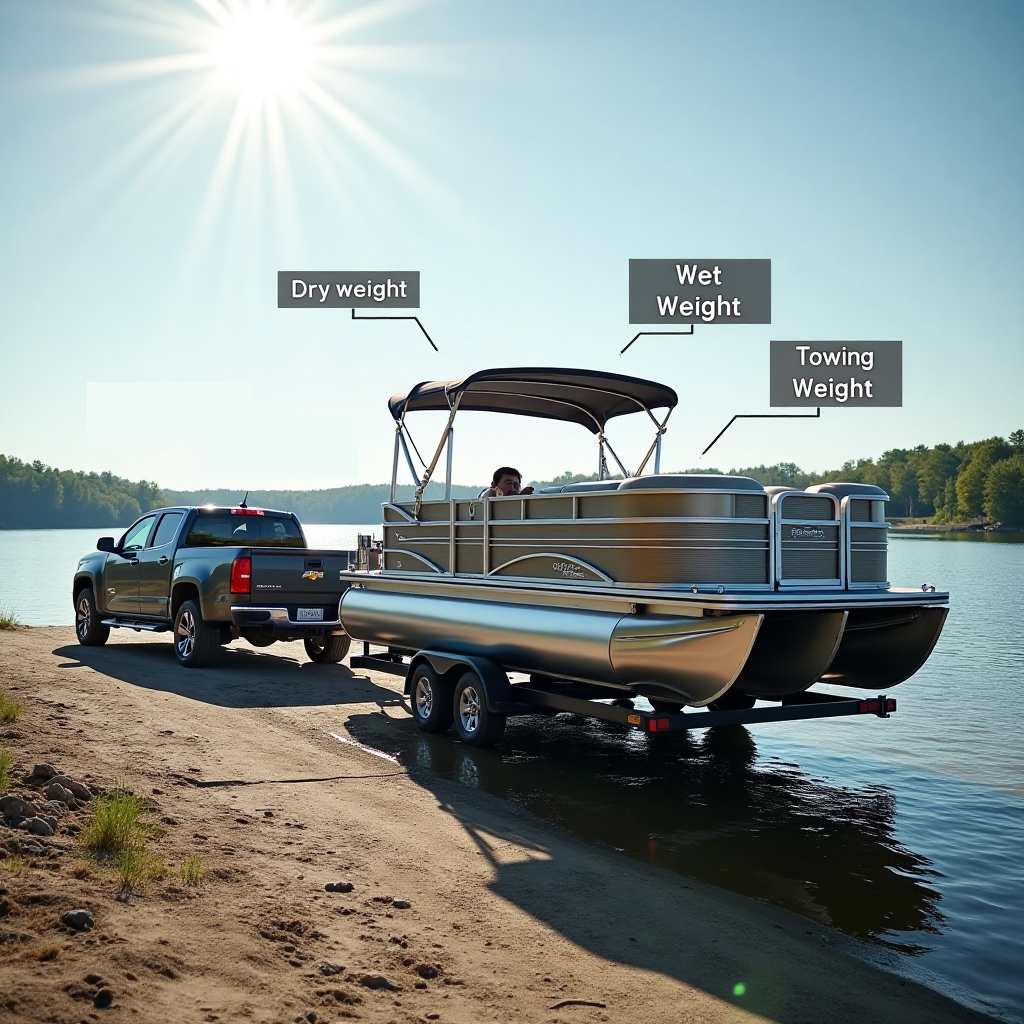If you’re wondering, “How much does a pontoon boat weigh?”—you’re in good company. Whether you’re prepping to tow your new boat, purchase a trailer, or simply curious, knowing the actual weight is crucial for safety and performance. But pontoon boat weight can vary drastically depending on size, materials, engine, and added features.
This guide covers it all: dry weight, wet weight, towing weight, what influences it, and real-world manufacturer data. Let’s dive in!
🧭 Pontoon Boat Weight Types: What You Need to Know
Understanding the different weight categories will save you from costly mistakes when choosing a trailer or tow vehicle.
| Weight Type | Definition | Includes | Use Case |
|---|---|---|---|
| Dry Weight | Weight of the boat as built | Boat body, furniture, sometimes engine | Comparing boats |
| Wet Weight | Boat with fluids and load | Dry weight + fuel, water, batteries | Boat lifts, docks |
| Package Weight | Factory estimate of full boat-trailer combo | Boat + motor + trailer (may exclude fluids/gear) | Dealer specs |
| Towing Weight | Total weight behind your vehicle | Wet weight + trailer + gear | Vehicle tow safety |
⚖️ Average Pontoon Boat Weights by Size
Use this as a general reference before checking manufacturer specs.
| Pontoon Length | Dry Weight | Wet Weight | With Trailer (Towing Weight) |
|---|---|---|---|
| 16–18 ft | 1,200 – 1,600 lbs | 1,600 – 2,000 lbs | 2,800 – 3,200 lbs |
| 20–22 ft | 1,800 – 2,200 lbs | 2,200 – 2,600 lbs | 3,400 – 3,800 lbs |
| 24–26 ft | 2,200 – 2,800 lbs | 2,800 – 3,400 lbs | 4,000 – 4,800 lbs |
| 28–30+ ft | 3,000 – 4,500+ lbs | 3,600 – 5,200+ lbs | 5,000 – 6,800+ lbs |
💡 Tip: Add approx. 200–250 lbs for fuel, 150–300 lbs for gear, and 1,200–1,500 lbs for the trailer when calculating towing weight.
🧪 Real-World Pontoon Boat Weight Examples
Here are some real examples to give you a better idea:
1. Small Pontoon Boats (16–18 ft)
| Model | Dry Weight | Motor | Package Weight |
|---|---|---|---|
| Sun Tracker Bass Buggy 16 XL | 1,565 lbs | 50 HP Mercury | 2,675 lbs |
| Avalon Venture 17 ft | 1,400 lbs | 40 HP Yamaha | 2,400 lbs |
| Lowe Ultra 160 Cruise | 1,565 lbs | 50 HP | 2,700 lbs |
2. Mid-Size Pontoon Boats (20–22 ft)
| Model | Dry Weight | Motor | Package Weight |
|---|---|---|---|
| Bennington S 22 Cruise | 1,923 lbs | 90 HP | 3,200 lbs |
| Godfrey Sweetwater 2286 | 2,200 lbs | 115 HP | 3,600 lbs |
| SunChaser Vista 22 LR | 2,000 lbs | 115 HP | 3,500 lbs |
3. Large Pontoon Boats (24–26+ ft)
| Model | Dry Weight | Motor | Package Weight |
|---|---|---|---|
| Manitou 25 Encore | 2,805 lbs | 150 HP | 4,500 lbs |
| Harris Solstice 250 | 3,200 lbs | 200 HP | 5,000+ lbs |
| Crest Classic LX 240 | 2,900 lbs | 150 HP | 4,800 lbs |
🏋️ What Affects a Pontoon Boat’s Weight?
The following components can significantly increase or reduce total boat weight:
| Factor | Effect on Weight |
|---|---|
| Boat length/width | More surface = more aluminum/furniture |
| Engine size | 50 HP ~200 lbs, 150 HP ~500+ lbs |
| Number of toons | Tri-toons heavier than twin-tube setups |
| Flooring | Vinyl & plywood heavier than bare aluminum |
| Accessories | Bimini tops, coolers, electronics add 100–500 lbs |
| Fluids | Fuel: ~6 lbs/gallon; Water: ~8.3 lbs/gallon |
| Trailer material | Steel heavier than aluminum |
🚗 Can Your Vehicle Tow a Pontoon Boat?
Here’s a reference table to match trailer weight with suitable vehicles:
| Total Towing Weight | Suggested Vehicle Type |
|---|---|
| ≤ 2,500 lbs | Small SUV (Honda CR-V, Subaru Outback) |
| 2,500 – 3,500 lbs | Mid-size SUV (Toyota Highlander, Ford Edge) |
| 3,500 – 5,000 lbs | Full-size SUV (Chevy Tahoe, Ford Explorer) |
| 5,000 – 7,000 lbs | Full-size truck (Ford F-150, RAM 1500) |
🧮 How to Calculate Towing Weight
Use this simple formula:
Towing Weight = Dry Weight + Motor + Fuel + Water + Gear + Trailer
Example:
Dry weight: 2,000 lbs
Motor: 300 lbs
Fuel (30 gal): 180 lbs
Gear: 200 lbs
Trailer: 1,200 lbs
Total Towing Weight = 3,880 lbs
📝 Final Takeaways
Pontoon boat weights vary from 1,200 to 4,500+ lbs (dry).
Towing weight often exceeds 3,000–5,000 lbs.
Always consider engine, fluids, trailer, and gear.
Check manufacturer specs and tow ratings carefully.
🔄 FAQs: Pontoon Boat Weight
Q: How much does a 20 ft pontoon boat weigh with trailer?
A: Around 3,400–3,800 lbs depending on gear and engine.
Q: Can a Toyota Highlander tow a pontoon boat?
A: Yes, if towing weight is under 5,000 lbs—ideal for boats ≤22 ft.
Q: What’s the lightest pontoon boat I can tow with a small SUV?
A: A 16 ft pontoon (~2,500–2,800 lbs total) is your best bet.






